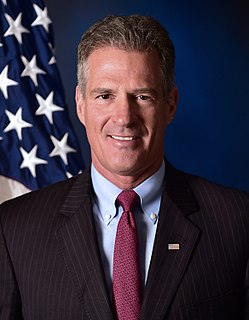A Quote by Annie Lowrey
Kids of the 1980s and 1990s have had a new, huge, financially catastrophic demand on their meager post-recession earnings, too: a trillion dollars of educational debt. About a quarter of Gen Xers who went to college took out loans to do so, compared with half of Millennials.
Related Quotes
The problem is that the way [President] Bush has done it over the last eight years is to take out a credit card from the Bank of China in the name of our children, driving up our national debt from $5 trillion dollars for the first 42 presidents - number 43 added $4 trillion dollars by his lonesome - so that we now have over $9 trillion dollars of debt that we are going to have to pay back. [That's] $30,000 for every man, woman and child. That's irresponsible. It's unpatriotic.
Donald Trump ran for office complaining that at $19 trillion, the US debt was completely out of control, and yet what he's planning to do is throw trillions of dollars more onto that debt. If the proposed tax plan cuts upon the wealthiest Americans is enacted, 10 years from now America's debt will be over $30 trillion. And so, he's contradicting, his own stated positions. And that's because, to Donald, none of this is about policy. It's not about sound economics. It's about greed and the glorification of the great leader.
It seems evident that the IMF has learned nothing from its inequality-inducing policies during the 1980s debt crises in Latin America nor from its recession-deepening response to the East Asian crisis of the late 1990s. In both regions, the IMF has become synonymous with making bad situations worse.
President Obama has offered a plan with 4 trillion dollars in debt reduction over a decade, with two and a half dollars of spending reductions for every one dollar of revenue increases, and tight controls on future spending. It's the kind of balanced approach proposed by the bipartisan Simpson-Bowles commission.
It took the national debt two hundred years to reach $1 trillion. Supply Side Economics quadrupled the national debt to over $4 trillion in twelve years (1980-1992) under the Republicans. Bill Clinton actually paid down the national debt. How did he do it? He raised taxes. It produced the longest sustained economic expansion in U.S. History.
It has become very difficult for anyone to argue that observed global warming is natural variability. We have good reason for being able to say that the world will be warmer by about a quarter of a degree in the next decade. It's the same reason we had 10 years ago when we said that the 1990s would be warmer than the 1980s: The planet is out of equilibrium.
It is my view that what is important is cutting government spending, however spending is financed. A so-called deficit is a disguised and hidden form of taxation. The real burden on the public is what government spends (and mandates others to spend). As I have said repeatedly, I would rather have government spend one trillion dollars with a deficit of a half a trillion than have government spend two trillion dollars with no deficit.
A consolidation makes sense only if you can lower your overall interest rate. Many people consolidate by taking out a home equity line loan or home equity line of credit (HELOC), refinancing a mortgage, or taking out a personal loan. They then use this cheaper debt to pay off more expensive debt, most frequently credit card loans, but also auto loans, private student loans, or other debt.
































